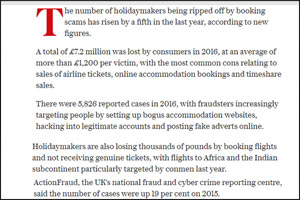Holiday Scams
Holidays are a season of scams — beware!
As you dream about sunsets, palm trees, sparkling white sand, crystal-clear seas, hammocks, and everything else related to your summer getaway, don’t forget to take heed of experts’ warnings about fraudulent travel websites and other holiday scams. From look-alike websites to rental rip-offs, social media giveaways to destination deceptions, fake shipping notifications to e-cards, letters from Santa to grandparent scams — holiday scams come in many forms. These also include fake charities, temporary holiday job offers, unusual forms of payment requests, and misleading offers like free gift cards.
Looking out for holiday deals online can alert con artists that you are in the market for that much-needed vacation, and they won't hesitate to approach you with enticing packages, prizes, or offers that almost always turn out to be too good to be true. So, be on your guard every step of the way! Holiday scams may not only affect you in the forms mentioned above—there are several other variations as well.
Holiday scams are deceptive practices specifically designed to exploit individuals during festive seasons. Common scams include online shopping fraud, where fake websites offer attractive deals to collect payments without delivering any goods. Phishing emails mimic legitimate organizations or retailers, tricking recipients into providing personal information or making fraudulent donations. Travel scams may involve misleading advertisements or fake accommodations, resulting in financial losses. Gift card scams exploit the anonymity of gift cards to carry out illegitimate transactions. Charity scams prey on the holiday spirit, with fraudsters posing as fake organizations to solicit donations. Additionally, package theft tends to rise during the holidays, as thieves target parcels left unattended after delivery. To avoid holiday scams, individuals should verify the authenticity of online retailers and charities, use secure payment methods, double-check travel arrangements, monitor their bank statements, secure delivered packages, and remain cautious of unsolicited communications.


Fake holiday taglines

Red flags
- Demonstrates a poor grasp of spelling, grammar, capitalization, and punctuation
- Uses a free online email service
- Demands payment via unsecured wire transfer
- Provides unsolicited payment information in the initial inquiry
- No traveler phone number provided
-
Trust your instinct—if something feels off or gives you an anxious feeling, it probably isn’t right
Report
If you suspect you are being scammed, you should report the crime to the local authorities without any second thoughts. If you have already been victimized, take immediate action.
File a report at your local police station about the fraud or scam. Be sure to keep a copy of the report, as it can be used when contacting your bank or credit reporting agencies to prove that you’ve been scammed and to request action on your behalf.
If you paid for the holiday using your credit card, report the fraud to your credit card company and your bank. Always stay alert—fraudulent advertisements do exist. If you have any suspicion, do not proceed with the booking.
In addition to keeping a copy of the police report, try to gather as much evidence as possible related to the suspected fraud. Evidence such as solicitation letters or emails, brochures, canceled checks, cash receipts, receipts for cashier's checks or money orders, bank statements, investment records, or even medical statements—all of these could help support your claim, aid in recovering your money, or at the very least, protect you from further harm.



